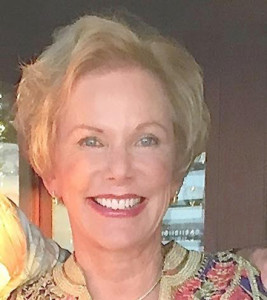Laura Taylor: We all come to the writing life as a consequence of inspiration. Sometimes it’s subtle, and sometimes it’s life altering. Whatever its origins, it serves as a catalyst for the writer. What originally inspired you to write, and do you feel even more inspired in your writing life all these years later?
Cyndy Muscatel: I am one of those people who has written most of my life. There is something that builds inside of me until it becomes sentences in my head that must get written down. That’s why I try to have a tablet, either paper or electronic, within reach. Even during the time period of this essay, “A Fine Line,” I took a notebook and pen with me to the hospital. That, and clean underwear.
When I feel something, I need to write about it. Poetry came first. The story telling started with paper dolls. I’d make up stories for my little sister, who’d watch enthralled as tragedy struck down the fragile figures. I think I learned to construct my dramatic arc from radio. I listened to soap operas like Stella Dallas and Ma Perkins while I was supposed to be napping as a child. I was an avid reader, as well, which teaches you almost everything you need to know on a subliminal level.
In my writing now, I want to reach people. I used to be in love with the words and their juxtaposition on the page. Now, my syntax is simpler and my stories, both fiction and non-fiction, reflect everyday life. I also use humor a lot more than I did in my younger days of Bronte worship.
I have moved into a new phase of writing—I’m not sure if it was inspired by blogging, but I love writing the non-fiction essays about my life. I still like a positive ending, even if not a happy one.
LT: Many writers are prone to creative habits, requiring a specific tone and tenor to their work space and their mindset. You’re a world traveler, by instinct and by design. Knowing that about you, I often wonder if you have an ideal writing environment, or are you able to adapt to most any environment with your imagination and a notepad?
CM: My worst fault as a writer is not giving myself time to write. I’m always multi-tasking and never have enough time in a day to get it all done. Although I’m not particularly materialistic, I want to have everything in my life: fresh flowers and fresh vegetables, good relationships with my kids, grandkids, my husband, friends and family. I want to be fit and flexible, to travel and learn Spanish. All this takes time from writing. I used to be a genius at multi-tasking; not so much anymore.
I ideally like to write at my desk in my office. I have two desk spaces; one for my computer and one for other work. I can swivel from one to the other.
LT: Many writers find the observations of some of their colleagues to be particularly meaningful in their writing lives. If asked to name the three writers who’ve most profoundly influenced your writing life, who would they be?
CM: Erma Bombeck certainly is one. I loved her columns and I wanted to grow up to be her. My humor columns are an ode to her. Laura, you are definitely another. You are both a model and a mentor for me. A third is my colleague, Carol Mann Stanfield. She and I used to meet every other week. We’d write for 45 minutes and then read what we’d written to each other. We still bounce stories and ideas off of each other.
LT: You’re an educator from a multi-faceted family background, and you’re surrounded by high achievers in the arts and in business. Do your family members perceive your writing as a reflection of both your life experiences and their own lives?
CM: Honestly, my family barely perceives that I write. I just sent them a copy of this essay, “A Fine Line”. I was shocked that my son had time to read it. He told me he hadn’t realized how sick I was at the time. When my kids were teenagers, I wrote slice-of-life humor pieces for the local newspaper. I had strict orders not to embarrass them. As for my husband? For years he couldn’t understand why I spent long hours at my computer.
LT: Book reviews can be the bane of a writer’s existence, but I believe they can also serve a constructive purpose. What is the toughest criticism you’ve ever received as a writer, and how have you turned it around and utilized it to improve your writing?
CM: This is a multi-faceted question. The toughest criticism I ever received was from a college professor, a well known poet, who was forced to teach a beginning short story writing class. He actually gave me the only C I ever got. He considered me a “Sally Sorority” girl and treated me with disdain. He wrote on the top of one of my stories, “Who would ever want to read this?” You know, that kind of thing stays with you forever. I don’t remember learning anything about craft in his class, and I quit writing for years after it. I learned from him to be careful what I wrote on my students’ papers. When I finally returned to writing twenty years later, one of my first stories was about a character returning to the University of Washington and shooting him.
The Santa Barbara Writers Conference is where I received tough critiques that benefited me. I started learning about story structure, plot development and characterization. I remember coming to one of your classes, Laura, with a story that I thought was finished. When you read it, the group didn’t like the ending. They also felt the main character needed to be stronger. Though I really didn’t want to, I took it home and reworked it, using some of their recommendations. Also, in one of Sid Stebel’s classes, he told me I should change my short story into a play. I don’t write plays. But I kept his critique in mind and changed the voice from third to first person, which brought immediacy to the story. Both stories were published as soon as I sent them out.
Laura Taylor is a Southern California based multi-published writer, editorial consultant, public speaker, and the recipient of numerous professional writing awards, including 6 RT Book Awards and 2 MAGGIE Awards. A long-time faculty member at the Southern California Writers’ Conference, she is an original Founding Member and served on the Board of Directors of Novelists, Inc. Visit Laura at www.LauraTaylorBooks.com to learn more about the author and her novels.



Pingback: “A Fine Line” by Cyndy Muscatel | Rkvry Quarterly Literary Journal
Pingback: R.K.VR.Y Quarterly | A Corner of My Mind
A FINE LINE is heartbreaking, poignant and filled with inspiration.
Author Cynthia Muscatel always writes from her heart.
Thank you! 🙂 LT
Thank you!
I enjoyed your interview and your honesty as a writer. Our “live” writing sessions were wonderful and now appreciate our online exchanges when we’re bouncing thoughts and ideas on current work. So happy to be a colleague.
Me too!!!!